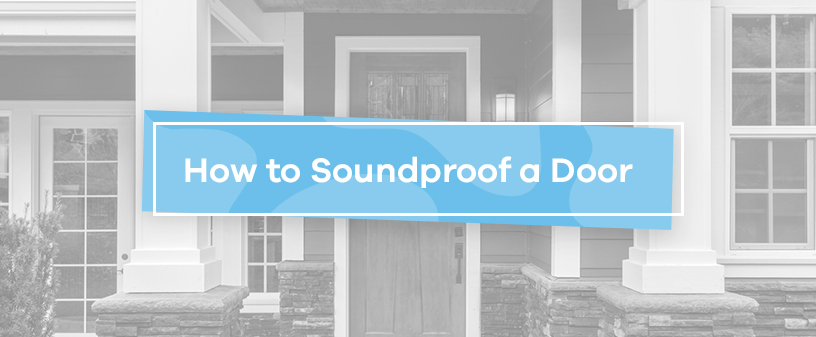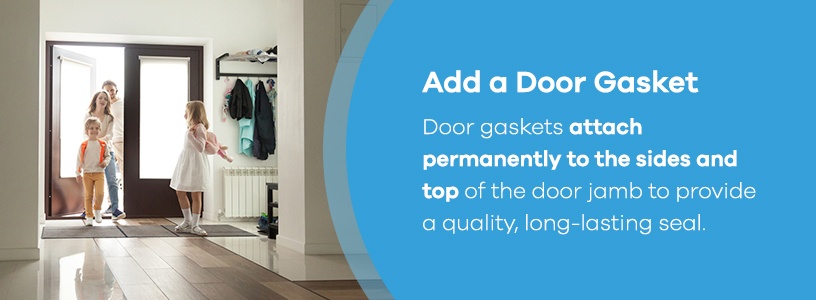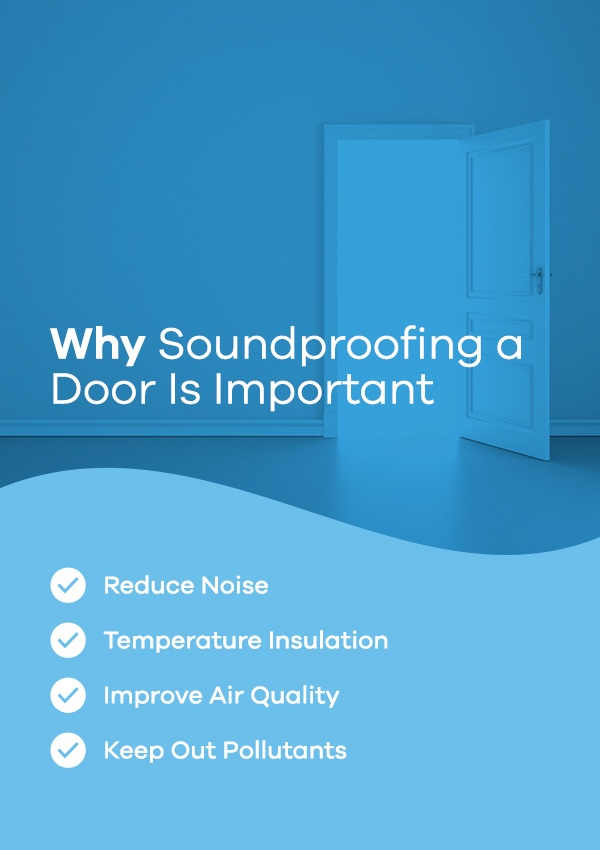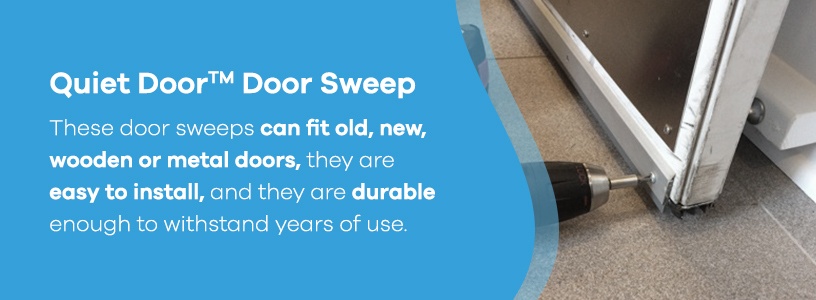Is There and Easy Way to Soundproof a Door

If you plan to soundproof a room or two in your home, don't forget to noise-proof a door. That's where the bulk of the sound leaks out, so soundproofing the door is particularly critical. Below, we'll discuss some benefits of soundproofing a door and offer some helpful tips on how to do it.
Shop Door Seals & Sweeps
Ways to Soundproof a Door
Complete door soundproofing requires extensive alterations to the existing door frame and labor-intensive construction. The weight of the door and its assembly can range from 300 to 500 pounds. Investing in a solid-core door or an acoustically rated door is also prohibitively expensive for many budgets.
So how do you soundproof a door? Below are some cost-effective, alternative methods to soundproof a door that will save you time, money and energy.
How to Soundproof Your Interior Door
To soundproof a door, you'll first want to examine where and how the sound is getting into the room. Then you'll choose the best method of blocking noise — this will be determined by your budget, home improvement experience, and the source of your problem. To solve your problem, try some of these methods for soundproofing your door.
1. Add Soundproofing Rubber To The Perimeter of The Door
This soundproofing method will be your go-to if extra space around your door is an issue, and you're just getting your feet wet in the home improvement world. Soundproofing rubber is typically a dense form of neoprene, and you can use it to soundproof the perimeter of your door.
-
If your door already has molding around it, you'll need to pry it off.
-
Then, add the soundproofing rubber around the door's edges.
-
Add acoustical caulk or an insulating sealant to fill in small gaps and cracks to add even more sound protection. If you're wondering where the cracks are, turn off the lights in the room and see where light comes in from outside.
2. Add Weatherstripping to Your Door
If you're putting up soundproofing rubber, you'll also want to fill in the gaps between the door and the doorframe. One of the easiest ways to do this is to use weatherstripping, commonly used to insulate doors and windows from the elements. Basic weatherstripping tends to degrade over time, but you can buy higher-quality varieties for long-term soundproofing. When you use weatherstripping around your door, remember to apply enough pressure. The pressure is what allows an airtight soundproof door seal to form and impede sound waves.
3. Add A Door Gasket
Door gaskets are a bit more expensive, so this is the method you'll want to use if you want a step up in quality from weatherstripping. Like weatherstripping, a door gasket helps fill in the gaps between the door and the door frame. Door gaskets attach permanently to the sides and top of the door jamb to provide a quality, long-lasting seal. Like soundproofing rubber, they often consist of high-quality neoprene. You can even purchase adjustable door gaskets — since doors sometimes warp or are otherwise not perfectly square, being able to adjust your gasket to get the best fit is a helpful feature.

4. Add A Door Sweep Underneath The Door
This step is crucial for closing the sizable gap that exists at the bottom of many doors. You can add all the gaskets and paneling you want to your door, but if there's a gap at the bottom, enormous amounts of sound will still leak through. To prevent this from happening, install a door sweep on the bottom of the door to close the door gap and impede sound waves. Soundproof door sweeps take some work to install — you'll need a drill and screws — but the immense improvement in soundproofing is often worth it.
5. Add An Automatic Door Sweep
You can even install an automatic door sweep. This kind of door sweep has a concealed flat-spring mechanism to control the sweep's movement. The sweep stays above the level of the floor while the door is open, but drops down when the door is closed to form a tight, soundproof seal with the floor.
6. Use Acoustic Panels On The Door
If adding many soundproofing elements to your door seems like too much work, try adding an acoustic door panel. These panels offer a step up from gluing a sheet of plywood to your door, but they're not generally as expensive as high-end solutions like fiberglass soundproofing blankets. They come in a range of materials, from the most popular — foam — to solid wood. They reduce the amplitude of the sound waves that pass through them, effectively soundproofing your door. You can nail them to the door, or to avoid damaging the door, you can use adhesive strips.
How to Soundproof a Metal Door
Metal doors present a logistical challenge because it's harder to drill through them. To soundproof a metal door, try these tips.
1. Add Door Thresholds
Door thresholds consist of neoprene with rubber protrusions that help fill in gaps at the bottom of the closed door. Unlike door sweeps, they attach to the floor of the doorway rather than to the bottom of the door. If you have a carpeted floor, having a threshold at the bottom of the doorway is crucial, because even the best door sweep will not perfectly seal the door with carpet. Some thresholds are flat, whereas others extend upward to form a double seal with a door sweep for a closed door.
2. Use A Soundproof Blanket
Though they can be costly, soundproof blankets, which are typically fiberglass, absorb sound very well and are easy to install. Put some suction hooks on the back of your door and hang the soundproof blanket on them. If you're not necessarily looking for a permanent solution, soundproof blankets also work well because you can hang them when you need them and take them down when you don't.
3. Use Acoustic Or Mass-loaded Vinyl Panels
Vinyl is easy to use and install. You can buy a sheet of vinyl and cut it to the size of your door. To attach it, use adhesive strips. Mass-loaded vinyl panels don't always enhance the aesthetic appeal of your door, but they are helpful in situations where utility is key.
Why Soundproofing a Door Is Important
Doors often contribute the most to noise issues, making them an essential element in any acoustical treatment.
The largest gap in a wall— and weakest link for soundproofing— is a doorway. Often, the space around the door leaks noise. And the space at the bottom of the door is often a much larger gap than the space around the sides, so it allows even more sound to leak through. Adding to the issue is that most interior doors have a hollow core. While this makes them more cost-effective, it causes more noise problems. Even the mechanism of the doorknob can admit some sounds.
Soundproofing your door helps address all these issues.
Soundproofing a door also provides a helpful ancillary benefit: temperature insulation. Many of the tools and materials used for soundproofing also provide insulation from extreme temperatures. So your newly soundproofed room will likely also cost much less to heat and cool.
Soundproofing your door can also help improve the air quality, humidity and comfort in your soundproofed room. Insulating the door helps keep out pollutants and moisture to keep the room comfortable to work or relax in.

A soundproof door is essential in several situations.
- You work from home: If you work remotely and need to concentrate, especially when you have a tight deadline, a soundproof door can be a lifesaver. If your work involves sound recordings or creating videos, a soundproof door is almost essential. But barking dogs, yelling neighbors, honking traffic, crying children — and, yes, even mooing cows — are all distractions that can get in the way of your work. A soundproof door helps you shut out the outside world and focus on what you need to do. Studies have shown that when a workplace removes conversational distractions — the noise of human speech — productivity increases by 48%, and stress symptoms decline by 27%.
- You have noisy neighbors: Nothing puts a damper on an otherwise ideal living setup like noisy neighbors. If you can hear your neighbors yelling, playing instruments or blasting their music at all hours, a soundproof door is a fantastic way to help give yourself some much-needed quiet.
- You are the noisy neighbor: If you play an instrument, blast your music, use your TV game at top volume or have to use sound features when you work from home, consider soundproofing your door. That way, the neighbors can enjoy peace while you work, rehearse or have fun.
Products From Soundproof Cow to Soundproof Your Door
Soundproof Cow offers an array of soundproofing products for you to choose from when you need to soundproof a door.
Seals and Sweeps
Consider the following variety of seals and sweeps for quality door soundproofing.
- Quiet DoorTM Perimeter Seal: The Quiet DoorTM Perimeter Seal fits tightly around a door to keep unwanted sounds from leaking in or out. Its long-lasting aluminum and silicone allow for effective noise reduction. It is versatile enough for use with all kinds of doors — new or old, metal or wooden — and it is easy to install with just a few basic tools.
- Quiet DoorTMAdjustable Perimeter Seal:The Quiet DoorTM Adjustable Perimeter Seal offers all the benefits of the Quiet DoorTM Perimeter Seal, plus added adjustability. It features several screws that allow you to push the seal out farther from the frame, so you can get the perfect fit. If the seal wears down, you can push it out again to make the fit as good as new.
- Quiet DoorTM Door Sweep: The Quiet DoorTM Door Sweep forms a tight, secure seal at the bottom of the door to ensure there's no gap where sound can sneak through. These door sweeps can fit old, new, wooden or metal doors, they are easy to install, and they are durable enough to withstand years of use.

- Quiet DoorTM Automatic Door Sweep: The Quiet DoorTM Automatic Door Sweep offers the benefits of the Quiet DoorTM Door Sweep and adds the convenience of an automatic feature. The door sweep automatically rises when you open the door and lowers when you close it, eliminating drag on the floor and providing an even more snug, secure seal.
Acoustic Panels
Soundproof Cow also offers an extensive catalog of acoustic panels.
- Art acoustic panels: Though some acoustic materials can look unsightly, ours are works of art. Our art acoustic panels are fully customizable, so you can send us an image and we'll transform it into a beautiful panel that both looks great and helps reduce noise.
- Fabric-wrapped acoustic panels: Our Udderly QuietTMAcoustic Panels are also pretty enough for decor, while functional enough to help soundproof your doors and walls. The fabric helps absorb sound waves to keep your space consistently quiet. You can choose from a variety of fabric designs or upload your favorite image if you'd prefer to personalize.
- Perforated acoustic wood panels: Our perforated acoustic wood panels have minuscule dents in them to help control, redirect and absorb sound waves. They are perfect for rooms where speakers or instruments will project sound, and they are elegant and artsy enough to blend in with even the most upscale decor.
Soundproof Door Kits
For maximum convenience, Soundproof Cow offers a couple of all-in-one door kits as well.
- Quiet DoorTM Commercial Soundproofing Kit: Why not get a variety of soundproofing tools in one convenient kit? The Quiet DoorTM Commercial Soundproofing Kit is perfect for commercial applications where you need to keep sound in. Maybe you have a welding shop, for instance, and want to prevent too much noise from escaping to the outside world. This kit comes with a sheet of Quiet BarrierTM LD Soundproofing Composite, a Quiet DoorTM Adjustable Perimeter Seal, a Quiet DoorTM Automatic Door Sweep and a tube of acoustical sound sealant, so you can do just that.
- Quiet DoorTM Residential Door Soundproofing Kit: Like the commercial soundproofing kit, the QuietDoorTM Residential Soundproofing Kit provides a variety of soundproofing tools in one convenient package. This kit includes a Quiet DoorTM Adjustable Perimeter Seal, a Quiet DoorTM Automatic Door Sweep and a tube of acoustical sound sealant, so you have all the tools you need for soundproofing any door in your home.
Caulking
Soundproof Cow offers a type of caulking that we think stands out from the rest: the OSI Pro-Series SC-175 Acoustical Sound Sealant, available in one tube or a case of 12. This acoustical sealant is a water-based sealant specifically designed to inhibit the transmission of sound waves. It won't crack, separate or harden over time, and it bonds securely to many materials, from metal to wood to drywall.
Contact Soundproof Cow for All Your Soundproofing Needs
Acoustics can be complicated. But finding the right products to soundproof your home or business shouldn't be. At Soundproof Cow, we want to make sure you find what you need to get the job done, no matter how big or small. We can help you noise-proof a door or a whole building. Our customers always come first, and you can consistently depend on our products.
Contact us today to learnmoooo-re!

Door Soundproofing Kits
Door Soundproofing Products
horrocksvinswasander1941.blogspot.com
Source: https://www.soundproofcow.com/soundproofing-101/how-to-soundproof-a-home-2/how-to-soundproof-a-door-2/
0 Response to "Is There and Easy Way to Soundproof a Door"
Post a Comment